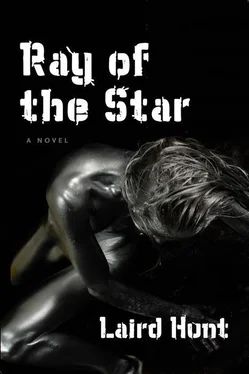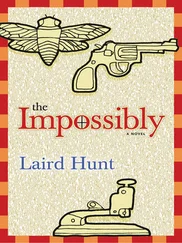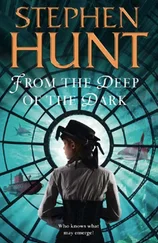“I couldn’t care less about any of that,” said Ireneo,
“Well, you should,”
“Go on talking if it makes you happy,”
“It does,” said the shoes, “You’ve put your finger right on it, it makes us extremely happy to talk, we almost can’t stand not to,”
“You never spoke in the old days,”
“We spoke all the time, you just weren’t ready to hear us,”
“That sounds like tawdry psychodrama talk,”
“Which doesn’t make it invalid,”
“No, just insufferable,”
“You wound us,”
“I doubt it,”
“You are right to doubt, after all it is doubt that leads straight to the heart of error and out the other side — where are we going?”
“There is no ‘we’ here, it’s just me and my shoes, out for a run, heading for the beach, la, la, la,” and it was certainly true that Ireneo was making for the beach, but at the last minute, almost in spite of himself, he turned and climbed up one of the high streets that led, by way of wildly interlacing cobblestone streets, to a series of vista points of the bay, including the very cliff mentioned a moment ago, which during the springtime was covered with innumerable white and yellow daffodils, and that now was an immense emerald lawn bordered by a white gravel path and low slate wall, which the shoes said they admired and which Ireneo, almost sprinting, bore down on, as if he meant to leap off it and soar into space, and put an early end, as it were, to the day, and as he got closer and closer the shoes kept talking about the wall and masonry and the masons that had worked on this one and what a bunch of crooks they had been even if they had done nice work, and so when Ireneo swerved at the last minute and deftly sent, instead of himself, the shoes sailing over the wall and out into space, they were still going on about crooks and the corrupt, ancient art of wall building, though one may suppose that as they stopped climbing and started falling, out of this story and into some other, they switched topics, which was what Ireneo, heaving a little after his exertion but satisfied that he had performed his civic duty by disposing of the shoes where no one else could easily pick them up and put them on and more importantly where, should he become tempted, he would have a very hard, not to say impossible time finding them again, now hoped it would be possible for him to do, although the first order of business would be to acquire some replacement footwear, as the sidewalk and street beyond the green lawn sparkled with glass and streaks of oil against which his thin running socks and even thinner soles would be no defense at all.
After spending time on the bed, Harry and Solange spent time at Harry’s kitchen table, where, over a few bites of this and that pulled out of Harry’s small refrigerator, Harry asked Solange to say a little more about the Lucite, he hadn’t quite grasped her interest in deploying it, that substance in particular, and she said that while she hardly understood it any longer herself, the initial impulse had come from a story she had partially overheard as she had leaned one morning against a palm tree and looked out to sea and considered walking into it and contriving not to return, whereupon two old women with thick ankles came and plunked themselves down near her and one told the other a story that she had read in a romantic novel of some sort, and had not approved of, about a boat builder who had lost his beloved wife after a protracted illness and who, in his grief, thinking of the amber pendant she had always worn in which an ant, dead millions of years, had been marvelously preserved, had given such serious consideration to plunging first her remains and then himself in the Lucite solution he used to coat the hulls of his boats that he had gone so far as to set her body on his workbench and to look for a proper receptacle, but as he did this, it seemed to him he felt a hand descend on his shoulder and a voice, her voice, whisper in his ear, that his grief was betraying him, and that he should stop and go and announce her death to the authorities and see to a proper burial, and that if he did this, she would come and visit him in his dreams, wearing his favorite dress, a promise Solange had not been able to hear if she had kept, and while all she had left of her young man were scraps, she had immediately gotten hold of some Lucite and begun encasing what she had, not in hopes of provoking an analogous response, she was too grief-stricken to hope for anything, but because — and it was this impulse that had driven her out to the beach in the first place — she had suddenly been overcome by an urge to devour the little pile of bits and pieces she had left of him — which had led her to wonder with horror what she would have done had his entire body been there — to pluck them up and drop them into her mouth, and while that unbidden impulse had remained as she set to work encasing the bits of knife metal in Lucite, it grew less acute over the coming weeks and before long seemed to have vanished altogether,
“Though of course nothing like that ever really vanishes,” Solange said,
“No it certainly doesn’t,” Harry said, and after they had sat silently gazing out over the sun-burnished rooftops around them, he added that while in this particular instance he was not in a position to empathize, he had heard of such cases, notably one involving a Buddhist monk, who had been unable to bear the thought of his dead lover’s body being given up to the flames or to the perceived ignominy of decomposition, and had consequently, presumably because no quieting hand had come down on his shoulder, eaten the body, an act that had, according to the story, cursed him, though Harry couldn’t say whether or not such an eventuality was merited,
“What happened to him?” Solange asked,
“He lived for many years as a madman in the ruins of his own monastery,”
“Then I’m glad that in the end I only nibbled on the end of one of my young man’s shoelaces.”
Solange and Harry emerged from the latter’s apart ment contentedly aware that their exchange of confidences, no matter how satisfyingly thorough, could reasonably be thought of as no more than an additional incipit in what — barring any unforeseen accelerant — would require a whole cascading series in order to move them toward that something they had not, during their discussion of the matter, been quite willing to articulate, though we might reasonably infer that the potential of an intense acquaintance bolstered by duration was under discussion, meaning that high spirits were the order of the evening as they set off for the boulevard to recuperate and stow away Solange’s silver costume and Harry’s Yellow Submarine before heading together, as they had agreed, to the café to have a light meal and a bottle or two of sparkling water ahead of the revelations to come, though when they passed the second floor door marked “Rubinski” their steps slowed and they exchanged glances, but a collective shrug seemed to take care of the matter for both of them and instead of further discussing ghosts as they walked they turned to the related but generally less noxious subject of dreams, for Solange had had a corker the previous night, a nacreous haze that had ended with a question, “What word do we use to indicate that tame lions are living among us?” while Harry had found himself in a landscape dotted with amalgamators on a walking tour led by a kind of magician whose face, the dream had proposed to him, was “shining like a wet sword,” and while neither Solange nor Harry was interested in digging around for submerged meaning in these dreams, they both found the inclusion of moments of language amidst the standard swarm of images strangely appealing, and no doubt would have found their way into an interesting conversation thereon as they gathered their things on the boulevard if Alfonso, still in full regalia, including his sword and hind legs, hadn’t been waiting, arms crossed over his armored chest, next to the submarine,
Читать дальше












